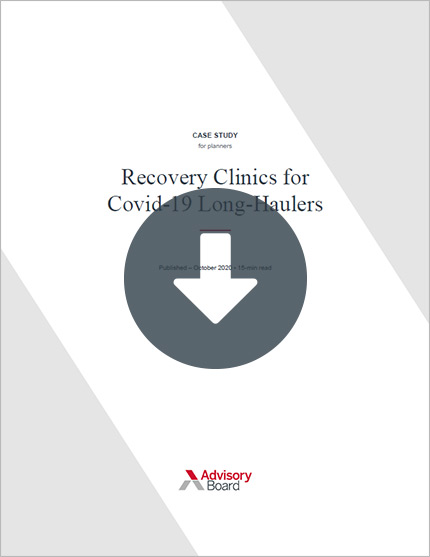Auto logout in seconds.
Continue LogoutMany long Covid patients experience debilitating symptoms that leave them too sick to work—but they are often denied both unemployment and disability benefits, leaving many to struggle with rising medical bills and a lack of income.
Recovery clinics for Covid-19 long-haulers
Background
According to NBC News, an estimated 7 to 23 million Americans have experienced long Covid, a chronic condition that can manifest in different ways depending on the person and cause a wide variety of symptoms that affect different parts of the body, such as the immune system, circulatory system, and more.
Although the cause of long Covid is still unknown, certain factors—such as the presence of certain autoantibodies and reactivation of the Epstein-Barr virus—potentially increases a person's risk. In addition, some research posits that many long Covid symptoms may be linked to damage to peripheral nerve fibers, which often results in weakness, fatigue, and pain in the body.
According to Fernando Carnavali, who leads the Center for Post-Covid Care at Mount Sinai Hospital, although many long Covid patients are "desperate" for an answer to their lingering symptoms, more research is still needed before any definitive conclusions can be drawn.
"We need to have more information before we feel confident sharing something [a specific cause of long Covid] with patients, just to be sure that we are not exerting them more than they can handle," he said. "We know that these people cannot really exert themselves, neither cognitively nor physically or emotionally, so you have got to be careful."
Long Covid patients also struggle with work, finances
In addition to lingering physical and mental symptoms, many long Covid patients are also struggling with other aspects of their lives, particularly work and their finances.
In an NBC News survey of 1,745 adults with long Covid, nearly 1,400 said the condition impacted their ability to go to work or attend school. In addition, 680 said long Covid impacted their housing or their ability to pay bills, and 611 said it impacted their insurance coverage.
Although many long Covid patients are unable to work, they often face difficulties getting their symptoms recognized so they can take necessary leave. According to David Putrino, the director of rehabilitation innovation for Mount Sinai Health System, it's often "luck of the draw" whether insurers accept his team's clinical opinion that a patient is currently unable to work.
"We try to be as objective as possible with all of our evaluation," he said. "But often, our most strident proof can just be dismissed with a single email saying, 'This isn't enough.'"
"The system is gearing itself against individuals with long Covid," Putrino added. "And that makes them sicker and sicker over time … causing them so much stress and exertion as they’re trying to get care that it actually makes the condition worse."
In addition, two taxpayer-funded programs, unemployment insurance and long-term disability insurance, are supposed to protect workers against lost income, but many people with long Covid are not eligible for either since they may be too sick to work but are not ready to leave the workforce completely.
"Long Covid cases fall into the huge middle ground between 'I have a cold' and 'I have stage four pancreatic cancer,'" said Kathleen Romig, director of Social Security and disability policy at the Center for Budget and Policy Priorities. "That's where we really have a huge gap in this country."
In response, patient advocacy organizations, such as the Covid-19 Longhauler Advocacy Project, are pushing lawmakers to act on long Covid outside of just funding studies and data collection.
In January, the group sent an open letter to more than 3,000 officials and suggested of dozens of new policies that could benefit long Covid patients, including a 9/11 style compensation fund and an additional question on the U.S. Bureau of Labor Statistics survey.
"All these people who are completely out of resources at this point, with no programs currently in the works, what are they supposed to do?" said Karyn Bishof, a former EMS worker in Florida who founded the Covid-19 Longhauler Advocacy Project. "There's nowhere for them to turn and nowhere for them to go until we get our lawmakers to act on our behalf." (Ramgopal et al., NBC News, 3/1; Bettelheim, Axios, 3/2; McCausland, NBC News, 3/2)
Download the case study

Several health systems have set up dedicated recovery clinics to help treat and coordinate care for long-haulers. This resource provides an overview of Covid-19 recovery clinic models pioneered by two early adopters—The University of Iowa Hospitals and Clinics and the University of Pennsylvania Medicine—and considerations for assessing whether it is a model you should pursue.
Don't miss out on the latest Advisory Board insights
Create your free account to access 1 resource, including the latest research and webinars.
Want access without creating an account?
You have 1 free members-only resource remaining this month.
1 free members-only resources remaining
1 free members-only resources remaining
You've reached your limit of free insights
Become a member to access all of Advisory Board's resources, events, and experts
Never miss out on the latest innovative health care content tailored to you.
Benefits include:
You've reached your limit of free insights
Become a member to access all of Advisory Board's resources, events, and experts
Never miss out on the latest innovative health care content tailored to you.
Benefits include:
This content is available through your Curated Research partnership with Advisory Board. Click on ‘view this resource’ to read the full piece
Email ask@advisory.com to learn more
Click on ‘Become a Member’ to learn about the benefits of a Full-Access partnership with Advisory Board
Never miss out on the latest innovative health care content tailored to you.
Benefits Include:
This is for members only. Learn more.
Click on ‘Become a Member’ to learn about the benefits of a Full-Access partnership with Advisory Board
Never miss out on the latest innovative health care content tailored to you.
